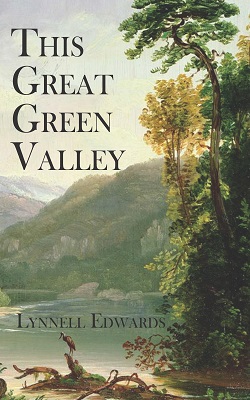Lynnell Edwards is author of three full-length poetry collections, Covet, The Highwayman’s Wife, and The Farmer’s Daughter, and the chapbooks, This Great Green Valley and Kings of the Rock and Roll Hot Shop. Her short fiction and book reviews have appeared in New Madrid, Connecticut Review, Cincinnati Review, Pleiades, and elsewhere. Her poems have been featured on Verse Daily. As associate professor of English at Spalding University in Louisville, Kentucky, she directed and taught first-year writing as well as other creative writing and literature courses. Awards include the 2007 Al Smith Fellowship. She is a founding member of Louisville Literary Arts, serving as its president 2008-2013; she currently serves on its advisory board. She served on the Kentucky Women Writers Conference Board of Directors 2012-2017. Edwards holds the PhD in Rhetoric and Composition as well as the MA with Creative Writing Thesis, both from the University of Louisville.

This Great Green Valley
Genius loci. The pervading spirit of a place. This little book from Lynnell Edwards is all about the spirit of a very specific place, in this case the environs of central Kentucky, and she writes about this place in two very different times, in two very different styles. So different, in fact, that one might first wonder what the two parts of the book have in common. The answer, of course, is genius loci.
In the original Roman use of the term, “spirit” meant the protective deity of a place. And in pioneer Kentucky, a place that Edwards’s McAfee ancestors helped to settle, that deity could be cruel. The historical narrative poems in the first part of the book recount many instances of hardship and violence, both as experienced by white settlers, and as dealt by them upon the Native Americans from whom they “conquered” this place. So harsh a place, in fact, that Governor Patrick Henry (when this land was still part of Virginia) begged his own sister, “Pray don’t go to Kentuckie to live.” But many did, and endured.
In the more contemporary sense, “spirit” means the unique sense and feel of a place, and in the second part of this book Edwards captures that spirit through her lyrical recollections of boating on the Kentucky River with her family, in her childhood, when she could imagine herself a
mermaid, my hair loosed
and living as tall field grass
drifting in the summer air,
white hands luminous
and slow, parting
the water below, open eyes
peering
into silence, the dark distance.
In effect she becomes, in this moment at least, the spirit of the place. A part of its deep past.
The violence of history, and the beauty and peace of nature. Edwards understands that both are present in the story of Kentucky, and of our nation as a whole, and she expresses both eloquently through the poetry here. Her love of this place is palpable, but it is no naïve love. She knows what it has cost, and she knows that it is fragile. Like the ancient limestone palisades along the Kentucky River, she words serve as a “record of what our great green Earth once was, and where, if we can keep it, we might still find our place.”